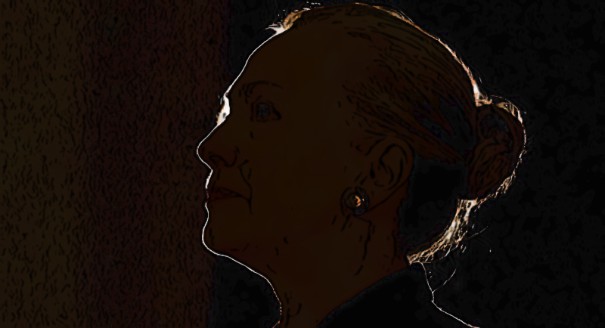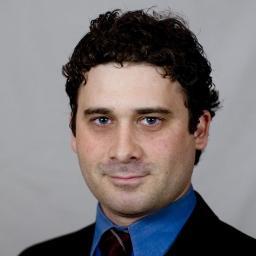
Behind the scenes, the Hillary Clinton presidential campaign is building a foreign policy and national security advisory structure that is meant to help her win the presidency. And among this group, the jockeying for jobs in her potential administration is already well underway.
Team Hillary is setting up formal advisory teams and working groups divided into regional and thematic subjects, similar to the structure of the National Security Council, several participants in the project told me. This isn't unusual for a campaign. What's unique here is the large number of advisers and and variety of views, because for Democratic foreign-policy types, Clinton is the only game in town.
The groups report up to the campaign's senior foreign policy adviser, Jake Sullivan, who was Clinton's deputy chief of staff and director of policy when she was secretary of state. Day-to-day management is also handled by Sullivan's deputy, Laura Rosenberger, who worked at Clinton's State Department and on Barack Obama's National Security Council staff.
In addition to the working groups, Sullivan relies on a somewhat separate group of senior former officials who have more frequent interaction with the campaign leadership and Clinton herself. Many of these advisers aren't publicly affiliated with the campaign because they have leadership roles with organizations that have not endorsed any candidate for president.
But sources close to the campaign told me that Clinton, Sullivan and campaign chairman John Podesta are in regular contact with former National Security Advisor Tom Donilon, former Defense Secretary Leon Panetta and former Secretary of State Madeleine Albright. Other former top officials include Michelle Flournoy, who was undersecretary of defense for policy; Kurt Campbell, who was assistant secretary of state for East Asia and the Pacific; and Nicholas Burns, who was undersecretary of state for political affairs. One source close to the campaign described the interactions as "studiously informal but regular."
Clinton's shadow foreign policy team was called into action last week when the campaign decided to criticize Senator Bernie Sanders for making what they cast as naïve and uninformed comments on the fight against the Islamic State and saying that the U.S. should "move as aggressively as we can to normalize relations with Iran."
"The stakes are high," 10 former officials wrote in an open letter. "And we are concerned that Senator Sanders has not thought through these crucial national security issues that can have profound consequences for our security."
The signers of that letter included Derek Chollet, a former Pentagon and White House official, and Julianne Smith, a former adviser to Vice President Joe Biden. Inside the campaign foreign policy structure, Chollet is a "senior partner" in the Middle East group, along with former State Department official Tamara Wittes. Smith has the same status in the Europe working group, along with former NSC official Phil Gordon. Campbell and Harvard professor Joseph Nye lead the Asia working group.
The campaign followed the release of the letter with public statements by Clinton and a conference call with reporters in which Sullivan cast Sanders' Iran views as outside the mainstream of Democratic national security thinking. "Normal relations with Iran right now?" Sullivan said. "President Obama doesn't support the idea. Secretary Clinton doesn't support that idea. And it's not at all clear why it is that Senator Sanders is suggesting it."
That kind of rapid mobilization of outside experts is a prime example of what Clinton's shadow council is meant to accomplish. The campaign also drew from the working groups to quickly devise positions on breaking crises such as the recent North Korea nuclear test and the murder of a politician in Venezuela.
In most campaigns, advisers line up with their preferred candidate in order to show loyalty and put in work in hopes of landing a prime appointment if their bet pays off. But things are different in 2016 because Sanders has only a small foreign- policy advising team.
In the first term of the Barack Obama administration, many of the campaign advisors were rewarded with plum postings. Denis McDonough became Obama's deputy national security advisor and eventually his chief of staff. Susan Rice became United Nations Ambassador and then National Security Adviser. James Steinberg was appointed deputy secretary of state. Some senior figures in that campaign, such as former Navy Secretary Richard Danzig, never got a job in the administration. If Clinton wins, she may go outside her advisory team to fill key positions, as Obama did when asking her to be part of his cabinet.
"Service for a candidate during the campaign is an important way to show how committed you are, but there's no guarantee," said Tommy Vietor, who worked in the Obama 2008 campaign team and served in Obama's NSC.
The Obama foreign policy team often clashed with the Clinton people over the years, but now those policy differences are less relevant. The Clinton campaign foreign policy structure is designed as a big tent where all are welcome.
"If you are a Democratic foreign policy official, you are now on Team Clinton. If you are an Obama person, you are adjusting," said former NSC official David Rothkopf. "The differences are still there."
In 2008, Obama competed with Clinton for big name advisers because he wanted senior figures to validate his judgment and policy views. Clinton, as the first secretary of state to vie for the presidency since James K. Polk, does not need such validation and already has well-formed views on almost every foreign policy issue imaginable.
The Clinton campaign has been quiet about its foreign policy stable because once figures are publicly associated with the campaign, they can be seen as surrogates and the campaign might be held liable for their remarks. Also, it is inevitable that many of the campaign's advisers will disagree with each other on issues, confusing the campaign's message.
For example, former Florida Gov. Jeb Bush rolled out a foreign policy advisory team early on that included former George W. Bush officials Bob Zoellick and Paul Wolfowitz, who don't agree on much of anything. Bush then immediately faced criticism from pro-Israel groups when another adviser, former Secretary of State James Baker, publicly criticized Israeli Prime Minister Benjamin Netanyahu.
Republican experts have also had a tougher time choosing whom to support in this contest. Zoellick had been working with New Jersey Gov. Chris Christie, but dumped him unceremoniously to join Bush. Several senior figures signed on to Wisconsin Gov. Scott Walker's campaign but then were forced to shift allegiances or sit on the sidelines when he suspended his campaign.
For Democrats in the national security community, the choice is clear. The Clinton campaign is smartly putting them to work but making no promises about their future employment.
Comment by clicking here.
Josh Rogin, a Bloomberg View columnist, writes about national security and foreign affairs. He has previously worked for the Daily Beast, Newsweek, Foreign Policy magazine, the Washington Post, Congressional Quarterly and Asahi Shimbun.
Previously:
• 02/02/16: Revealed: The Trump foreign policy doctrine
• 01/27/16: Bergdahl defense could call his loudest foe, Trump
• 01/07/16: Why when North Korea forces Obama's Washinton to pay attention all the U.S. government can do is grieve
• 01/06/16: Obama's Mideast balancing act tilts to Iran
• 12/28/15: Assad is reaching out to Washington power brokers
• 12/23/15: U.S. quietly negotiating to free Americans in Syria
• 12/21/15: Russian arms in Syria keep U.S. grounded
• 11/17/15: Assad's Paris win
• 11/12/15: The Pentagon's lonely war against Russia and China
• 11/05/15: Iran, Saudi Arabia clash inside Syria talks
• 10/28/15: U.S. is driving Mideast allies to Putin
• 10/26/15: Source of Hillary's Libya data a mystery
• 10/21/15: Team Jeb calls out Trump for trashing Freedom Tower
• 09/23/15: Xi visit marks downturn in US-China relations
• 08/31/15: Walker stakes his territory on foreign policy
• 06/08/15: Hillary just lost one of her only selling points
• 03/02/15: An Obama deal with Iran could die with his days in office
• 02/23/15: Shock, awe and Jeb Bush's foreign policy dream team
• 01/22/15: At GOP pow-wow 2016 front-runners pledge, lay out vision to restore America's world leadership role


 Contact The Editor
Contact The Editor
 Articles By This Author
Articles By This Author
